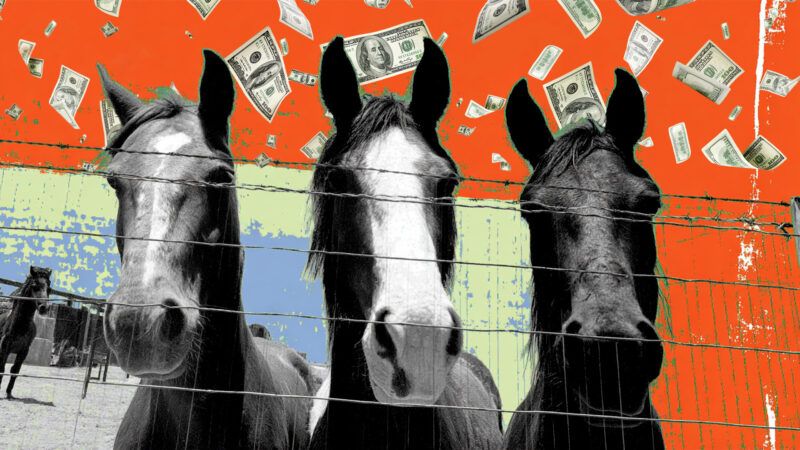The Government Seized 7 Horses From a Georgia 'Urban Cowboy.' A Court Says He Can Sue.
In a rare and significant decision, a federal court ruled Brandon Fulton can sue directly under the Takings Clause—without Congress creating a specific remedy.

The Constitution pledges that the government cannot take your property without "just compensation." So if that happens, and no statute passed by the legislature applies to your specific case, can you sue?
That this is even a question may sound, at a minimum, harebrained. After all, the Constitution is the supreme law of the land. But whether or not that promise—as found in the Fifth Amendment's Takings Clause—is effectively an empty one when it is not paired with a relevant law is a matter of active legal debate.
A federal court attempted to answer it last week in a case that hinged on, of all things, a local "urban cowboy."
Fulton County, Georgia, seized seven horses from Brandon "Brannu" Fulton in 2017 after he was charged with animal cruelty. (The identical last name here is an unfortunate coincidence for the sake of clarity, but we will persevere.) Those charges were later dropped. But the government still declined to return the animals to Fulton—long ago dubbed Atlanta's Urban Cowboy after his affinity for riding into town on horseback—nor would it compensate him for their value. One of those horses, he said, is worth $35,000.
Fulton (the man, not the county) sued under Section 1983, the federal statute that allows plaintiffs to bring lawsuits against state and local governments for violating their constitutional rights. But his suit was ultimately doomed by the Monell doctrine, which shields municipalities from facing liability for such claims unless a plaintiff can pinpoint an official government policy or custom that caused the alleged violation.
Fulton (the county, not the man) didn't have an applicable policy. And for procedural reasons, the Urban Cowboy's claims were barred under state law, as well. So he sought to rein back and redirect his complaint to sue directly under the Takings Clause itself.
In what is somewhat of a seismic opinion, the U.S. Court of Appeals for the 11th Circuit said he could. "Our Constitution explicitly promises exactly two remedies: 'just compensation' if the government takes our property, and the writ of habeas corpus if it tries to take our lives or liberty," wrote Judge Robin S. Rosenbaum for the majority. "And the Constitution delivers directly on each. It doesn't taunt us by naming these remedies but then holding them out of reach, depending on the whims of the legislature."
Many had hoped the Supreme Court would answer this exact question just last year. In DeVillier v. Texas, the justices heard a case brought by people whose property was damaged after the state constructed highway barriers that diverted massive amounts of floodwater onto their private land. Texas did not contest that the Takings Clause necessitates just compensation for people whose private property is taken by the government. But it promptly had the case moved to federal court, where it argued it could not be sued for damages because Congress has not passed a relevant statute ordering Texas to abide by the Takings Clause.
The 5th Circuit agreed.
The Supreme Court did not. In a unanimous opinion, the justices ruled that the plaintiffs could sue Texas—in state court. Yet while the Court agreed the property owners could invoke a state law cause of action, it did not address the broader dispute over whether a legislative cause of action is required at all. "Our precedents do not cleanly answer the question whether a plaintiff has a cause of action arising directly under the Takings Clause," wrote Justice Clarence Thomas. "But, this case does not require us to resolve that question."
The 11th Circuit, meanwhile, did. In dissent, Judge William Pryor argued the decision leaves "constitutional wreckage" by "creat[ing] a new right of action for takings of property by local governments." As the majority points out, however, that conclusion "ignores the original public meaning of the [Takings] Clause," which exists to provide relief to people whose private property is usurped by the government. "We have a duty to apply the Constitution as written," writes Rosenbaum. "So we respectfully decline to read out of the Constitution the relief it expressly promises for taken property."
Editor's Note: As of February 29, 2024, commenting privileges on reason.com posts are limited to Reason Plus subscribers. Past commenters are grandfathered in for a temporary period. Subscribe here to preserve your ability to comment. Your Reason Plus subscription also gives you an ad-free version of reason.com, along with full access to the digital edition and archives of Reason magazine. We request that comments be civil and on-topic. We do not moderate or assume any responsibility for comments, which are owned by the readers who post them. Comments do not represent the views of reason.com or Reason Foundation. We reserve the right to delete any comment and ban commenters for any reason at any time. Comments may only be edited within 5 minutes of posting. Report abuses.
Please to post comments


Looks like the taxpayer will be saddled with the bill and will be required to pony up the money to make him whole.
The government is always chomping at the bit to trample our rights. But if libertarians are feeling their oats, they will answer with a hearty "neigh!"
If he wins or loses his case, he'd be wise to hoof it out of town afterwards.
The taxpayers elected the government that committed this offense and deserve to get screwed.
You suck at everything
Only a lawyer would think a legislature has to pass a law for everything in the US Constitution.
Mr. Fulton
Fulton County.
There, differentiation solved.
Hang horse thieves
Judge William Pryor was specifically mentioned by Donald Trump as being on his short list for a Supreme Court appointment.